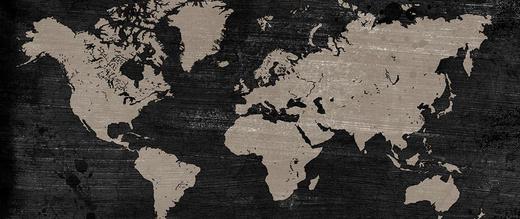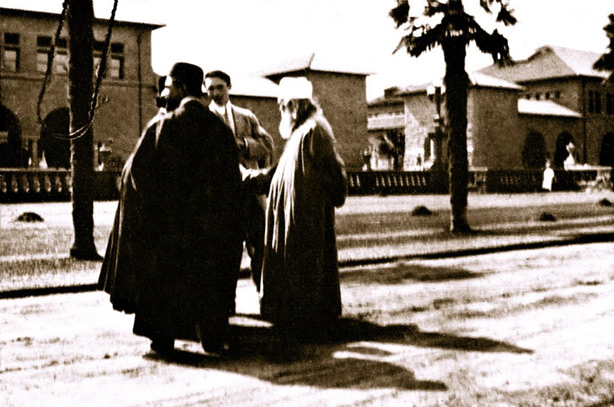The views expressed in our content reflect individual perspectives and do not represent the authoritative views of the Baha'i Faith.
I hope that you people are reasonable enough not to fight over your graves, and that you will enjoy the utmost of fellowship, like one family—brothers, sisters, mothers, fathers—enjoying peace and having a good time. – Abdu’l-Baha, Star of the West, Volume 3, No. 12, p. 15.
It is my hope that you who are students in this university may never be called upon to fight for the dust of earth which is the tomb and sepulcher of all mankind, but that during the days of your life you may enjoy the most perfect companionship one with another, even as one family — as brothers, sisters, fathers, mothers — associating together in peace and true fellowship. – Abdu’l-Baha, The Promulgation of Universal Peace, p. 355
On October 8, 1912, as World War I approached, Abdu’l-Baha gave an important antiwar address to the students and faculty of Stanford University in the San Francisco Bay Area of Northern California.
The two different translations above—one from a Baha’i journal of the period called Star of the West, and another from a contemporary book called The Promulgation of Universal Peace—both come from the same source document, a record of the talk taken down by a young Baha’i stenographer, Miss Bijou Straun. She recorded the simultaneous English translation of Abdu’l-Baha’s talk on the fairly rudimentary stenographic equipment of the time.
And while the second translation seems more lofty and elevated, I like the first one, in its much simpler, more conversational and colloquial tone. Basically, Abdu’l-Baha told the Stanford students not to fight and kill over their tombs, just as he had counseled young people for decades:
I wonder at the human savagery that still exists in the world! How is it possible for men to fight from morning until evening, killing each other, shedding the blood of their fellow-men: And for what object? To gain possession of a part of the earth! Even the animals, when they fight, have an immediate and more reasonable cause for their attacks! How terrible it is that men, who are of the higher kingdom, can descend to slaying and bringing misery to their fellow-beings, for the possession of a tract of land!
The highest of created beings fighting to obtain the lowest form of matter, earth! Land belongs not to one people, but to all people. This earth is not man’s home, but his tomb. It is for their tombs these men are fighting. There is nothing so horrible in this world as the tomb, the abode of the decaying bodies of men.
However great the conqueror, however many countries he may reduce to slavery, he is unable to retain any part of these devastated lands but one tiny portion — his tomb! If more land is required for the improvement of the condition of the people, for the spread of civilization (for the substitution of just laws for brutal customs) — surely it would be possible to acquire peaceably the necessary extension of territory. But war is made for the satisfaction of men’s ambition; for the sake of worldly gain to the few, terrible misery is brought to numberless homes, breaking the hearts of hundreds of men and women!
How many widows mourn their husbands, how many stories of savage cruelty do we hear! How many little orphaned children are crying for their dead fathers, how many women are weeping for their slain sons! There is nothing so heart-breaking and terrible as an outburst of human savagery!
I charge you all that each one of you concentrate all the thoughts of your heart on love and unity. When a thought of war comes, oppose it by a stronger thought of peace. A thought of hatred must be destroyed by a more powerful thought of love. Thoughts of war bring destruction to all harmony, well-being, restfulness and content. Thoughts of love are constructive of brotherhood, peace, friendship, and happiness.
When soldiers of the world draw their swords to kill, soldiers of God clasp each other’s hands! So may all the savagery of man disappear by the Mercy of God, working through the pure in heart and the sincere of soul. Do not think the peace of the world an ideal impossible to attain! Nothing is impossible to the Divine Benevolence of God.
If you desire with all your heart, friendship with every race on earth, your thought, spiritual and positive, will spread; it will become the desire of others, growing stronger and stronger, until it reaches the minds of all men. – Abdu’l-Baha, Paris Talks, pp. 28-30.
Here, in this powerful speech, Abdu’l-Baha gives us another good reason not to kill: because nations fight wars “for the sake of worldly gain to the few.”
Consider the recent American/Coalition war in Iraq, and its horrible human toll. We will probably never know how many people died in that war and its aftermath, which still takes lives every day, but secret US military documents released by Wikileaks number the Iraqi and Coalition military deaths (between January 2004 and December 2009) at 109,032 people. And for what? Did the violent premature deaths of a hundred thousand human beings actually help anyone or advance the cause of peace? Did they make the world safer? Or did that war destabilize the entire region, spawn more war, and serve primarily to enrich large corporations and defense contractors?
When I ask high school students if they would risk their lives for their country, many say yes, in a naïve but generously patriotic way. But when I ask if they would risk their lives for their graves, or for the profit of a few individuals or corporations, you can probably imagine how they answer.


















Comments
Sign in or create an account
Continue with Facebookor